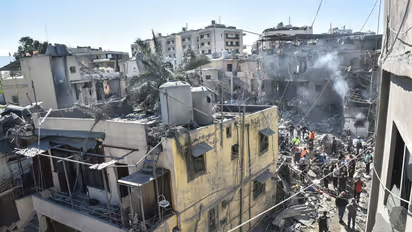Caught on camera: Israeli missile strike reduces Beirut building to rubble in seconds; WATCH chilling video

Synopsis
A shocking video circulating on social media has revealed the devastating moment an Israeli missile struck a building in Beirut, resulting in its complete destruction within seconds.
As tensions between Israel and Iran-backed terrorist group Hezbollah in Lebanon escalate, a startling video that has gone viral on social media shows the moment an Israeli missile hit a building in Beirut, completely destroying it in a matter of seconds. Residents and bystanders in the vicinity were shocked by the incident and left in shock.
Photographer Bilal Hussein of the Associated Press captured the hit from a close location. He took cover behind a big tree and pointed his camera at an apartment complex that the Israeli military had designated as a target.
"I heard the sound of the missile whistling as it headed toward the building, and then I started filming," Hussein recounted just hours after the attack. His footage captures the missile frozen in mid-flight before it obliterated the structure.
Israel issued warning of Beirut strike
An Israeli military spokesperson warned inhabitants in and around two buildings on the southern suburbs of Beirut to evacuate in Arabic, around 40 minutes prior to the missile strike, in a social media post. The spokesperson stated that the buildings were close to "interests and facilities" connected to Hezbollah, but he did not elaborate on the reasons behind the strike.
Many people of the crowded and busy neighbourhood left after receiving this warning, but some, including some journalists, decided to stay and watch.
No deaths were reported, and the facility had already been evacuated when the missile struck. Notably, two smaller projectiles were fired at the building's roof before the main missile strike—a strategy used by the Israeli military as "warning strikes." This tactic has been used in the past, especially in the wars in Gaza.
AP photographer who caught the chilling moment speaks out
Since joining the AP in 2004, Hussein has been reporting on wars in Iraq and Lebanon, and he has become used to hearing bombs. He recorded about a dozen Israeli assaults in the area the night before the missile strike.
"I have the ability to control my reactions in critical moments and maintain stability as much as possible," he reflected.
As the situation in Beirut remains tense, the impact of this latest attack continues to reverberate throughout the city.
Check the Breaking News Today and Latest News from across India and around the world. Stay updated with the latest World News and global developments from politics to economy and current affairs. Get in-depth coverage of China News, Europe News, Pakistan News, and South Asia News, along with top headlines from the UK and US. Follow expert analysis, international trends, and breaking updates from around the globe. Download the Asianet News Official App from the Android Play Store and iPhone App Store for accurate and timely news updates anytime, anywhere.